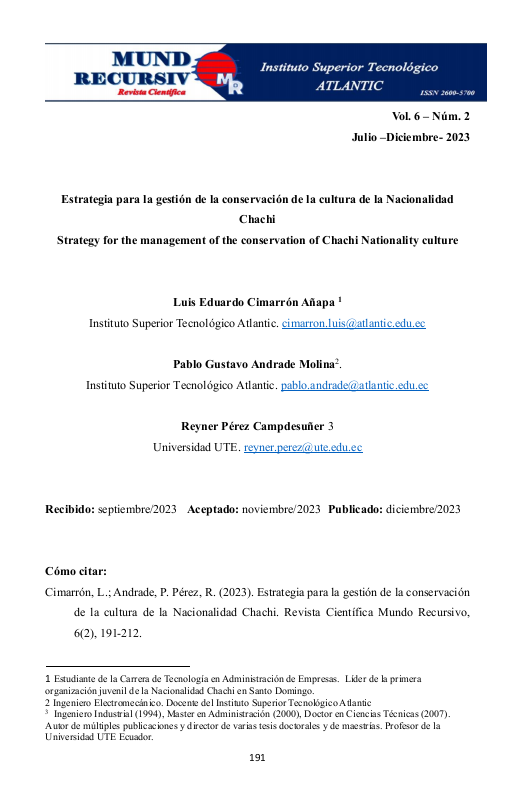Strategy for the management of the conservation of Chachi Nationality culture
Keywords:
Organizational Culture, Administration, Chachi NationalityAbstract
Organizational culture constitutes a distinctive and determining element of the performance of any type of organization, conditioning the establishment and achievement of the objectives that make up any collective. For this reason, there are various variables that characterize culture, as well as methodologies used for its analysis. The Republic of Ecuador is recognized as a multinational state where different rights and cultural expressions of various nationalities must be promoted and defended. Among the nationalities coexisting in the country is the Chachi nationality, whose members seek to defend, promote, and perpetuate Chachi culture. This research presents a characterization of several distinctive elements of Chachi culture, identifying aspects that set it apart, as well as the negative impacts of other cultures on its own evolution. Based on these results, three strategies are proposed to promote, strengthen, and disseminate Chachi culture.
References
Armenakis, A., y Lang, I. (2014). Forensic Diagnosis and Transformation of an Organizational Culture. Journal of Change Management, 14(2), 149-170. https://doi.org/10.1080/14697017.2013.84
d’Iribarne, P. (2009). National Cultures and Organisations in Search of a Theory. An Interpretative Approach. International Journal of Cross Cultural Management, 9(3), 309-332.
Dailey, R. (2012). Comportamiento organizacional. Heriot-Watt University
García Vidal, G; Guzmán Vilar, L.; Pérez Campdesuñer R.; Sánches Rodríguez A.; Martínez Vivar R.; Uset Ruiz, F. Una Visión Critica a la Cultura Organizacional. Ed. UTE. ISBN 978-9942-843-09-8 . 120 pp.
Harris, M. (2013). Antropología cultural. (1 ed.). Alianza Editorial
Katzenbach, J., Oelschlegel, C., y Thomas, J. (2016). 10 Principles of organizational culture. strategy+business (82), 1-7. https://bit.ly/3gHiRxjKotter, J. P., y Heskett, J. L. (1992). Corporate Culture and performance. Free Press.
Kostovski, N., Bojadjiev, M., y Buldioska, K. (2015). Leadership styles and organizational culture in macedonian companies. Journal of Sustainable Development, 5(13), 33-44. https://bit.ly/2Uck4ox
Janicijevic, N. (2013). The Mutual impact of organizational culture and structure. Ekonomski Anali / Economic Annals, 58(198), 35-60. https://doi.org/10.2298/EKA1398035J
Neelam, N., Bhattacharya, S., Sinha, V., y Tanksale, D. (2015). Organizational culture as a determinant of organizational commitment: What drives it employees in India? Global Business y Organizational Excellence, 34(2), 62-74. https://doi.org/10.1002/joe.21594
Real Academia Española (2014). Cultura. Diccionario de la lengua española. https://dle.rae.es/?w=culturaym=form
Stewart, A., & Stewart, V. (1972). How to get the best out of external courses. Industrial and Commercial Training, 4(10), 489-492. Scopus. https://doi.org/10.1108/eb003257
UNESCO. (1982). Conferencia Mundial sobre las Políticas Culturales. https://bit.ly/2TOm5ae

Published
Issue
Section
License
Copyright (c) 2024 MUNDO RECURSIVO

This work is licensed under a Creative Commons Attribution-NonCommercial 4.0 International License.









